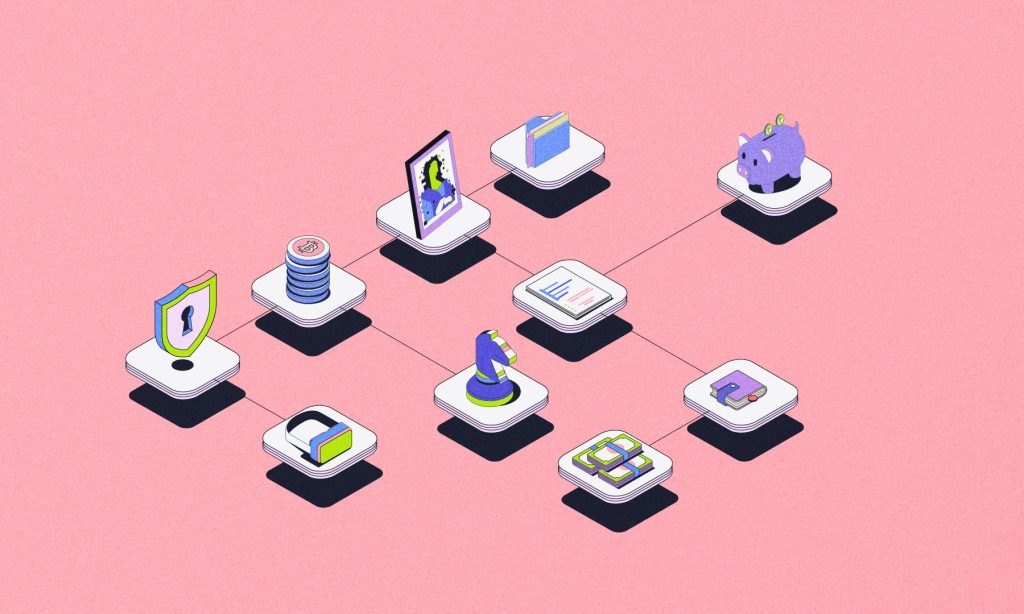As the world adopts digital advancements, financial systems are also changing. One of the most noteworthy developments in recent years is decentralized finance, also known as DeFi. DeFi has the potential to revolutionize how traditional finance and change the future of finance. In this article, we will delve into the advantages, growth, and future possibilities of this innovative technology.
What is DeFi?
DeFi refers to a financial system that operates on digital ledger technology like blockchains. These ledgers allow the recording and storage of transactions across a network of computers. Unlike traditional finance, which is centralized and controlled by banks and centralized financial institutions, DeFi is decentralized. Meaning it is powered by smart contracts and code rather than intermediaries that do the work of banks. Powered by the network of computers, they ensure that transactions are verified, and the transactional history is immutable.
The role and growth of DeFi
DeFi has seen rapid growth in recent years. The total value locked in DeFi protocols surpassed ₹413 crore in 2022. This growth, despite the FTX collapse, can be attributed to the advantages DeFi offers over traditional finance. One of the primary benefits of DeFi is its openness and transparency. Anyone with an internet connection and a crypto wallet can transact. And any user can verify transactions. The former makes it possible for people who do not have access to traditional financial services to join the global financial system. The latter ensures transparency and accountability.
DeFi also offers faster and cheaper transactions as it eliminates intermediaries and a lot of the physical infrastructure. So anyone can send and receive payments and loans quickly and securely without having to pay fees to banks. And the money spent on buildings et cetra becomes unnecessary.
The benefits of DeFi
While we already have broached the subject of benefits tangentially in the previous section, it is always useful to lay out the key points for the sake of clarity. So here goes:
- Decentralization: The idea of decentralization means that the system is not controlled or run by a centralized authority—like a bank. As a result, it is less susceptible to corruption or manipulation. Additionally, because of this, DeFi offers better access, and speed at a lower cost.
- Security: This is related to the previous point but it deserves to be highlighted nonetheless. With traditional finance, your money is often held on a centralized server. That makes it vulnerable to hacks and theft. DeFi, however, is decentralized, which means that there is no central point of failure. In addition, DeFi protocols use advanced cryptography to ensure that your funds are secure.
- Passive income source: DeFi also creates the possibility of earning passively through various protocols. For example, users can lend their crypto and earn interest or stake their tokens and earn rewards.
- Accessibility: With traditional finance, there are often barriers to entry. There’s the issue of documentation or the lack thereof. And the requirement of high fees or minimum account balances. DeFi, on the other hand, is open to anyone with an internet connection. So even those who do not have access to traditional financial services can participate in DeFi.
The future of DeFi
The rise of DeFi has been fueled by the growing interest in blockchain technology and crypto. The range of financial services, including borrowing and lending, trading, and asset management, DeFi offers has great appeal. And while traditional finance has also taken the digital route, DeFi does a better job of it.
DeFi makes financial services more accessible and affordable to a wider range of people. It has the ability to reach the unbanked and underbanked populations that traditional finance has failed to serve. This is particularly important in in developing countries, where access to financial services is limited and the cost of transactions is high.
Additionally, as globalization spreads, a financial system that can operate across borders will become even more important—if not indispensable. DeFi, therefore, has great potential on this account, too.
Conclusion
To summarize all we’ve been discussing, DeFi is the future of financial systems. The emergence of DeFi signals a great transformation in the financial sector. It comes with advantages like transparency, security, and ease of access. It has the potential to restructure the conventional financial landscape due to these features.
DeFi crypto and blockchain technology have immense potential. Therefore, it is essential to comprehend the opportunities and challenges it brings. Its decentralized nature, higher transparency, and potential to generate passive income are appealing. And as globalization spreads, DeFi is likely to play an even greater role in digital finance and the crypto world.
FAQs
How will DeFi change finance?
DeFi has the potential to change the finance industry. It can create a more inclusive and accessible system that operates without intermediaries, such as banks. This will result in lower transaction costs, faster settlement times, and more transparent financial systems. DeFi platforms can also provide a wider range of financial services, such as loans and investments.
How will DeFi and Web 3.0 shape the future of finance?
The combination of DeFi and Web 3.0 will shape the future of finance. They offer more accessibility to financial services, enhanced security and privacy, and reduced fees. The two also help boost financial inclusion.
Will DeFi replace banks?
DeFi is a growing trend in the financial industry, but it is unlikely to fully replace traditional banks. While DeFi’s decentralized system has many benefits, banks still enjoy governmental backing. Besides, DeFi cannot offer these services at the same scale. However, DeFi does offer an alternative for people seeking more control and transparency.
What problems does DeFi solve?
DeFi solves various problems that exist in traditional finance, such as centralization, intermediaries, and lack of transparency. DeFi also enables easy access to financial services for the unbanked population. Overall, DeFi is bringing forth a new era of financial freedom and accessibility for everyone.








